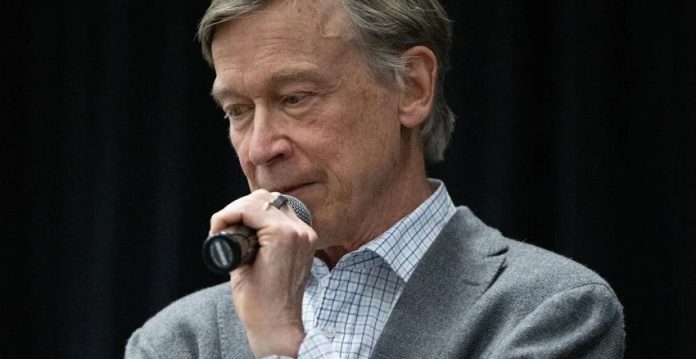COLORADO SPRINGS, CO — A town hall meeting at the University of Colorado Colorado Springs (UCCS) on Wednesday evening saw around 1,000 residents gathered to voice their concerns to U.S. Senator John Hickenlooper. The event centered on several pressing issues, with U.S. Space Command’s potential relocation to Huntsville, Alabama, taking center stage.
Senator Hickenlooper addressed the crowd, emphasizing the operational impact that relocating Space Command could have on both national security and local economic stability. “We are at full operational capability right now, for the first time in seven years,” Hickenlooper stated. “That would be compromised if we started moving it down to Huntsville. It would take six, seven, eight years of less than 100% operational capability. We can’t afford it right now.”
The relocation issue has been a source of significant concern for Colorado Springs, which has long been home to U.S. Space Command. Hickenlooper warned that the move could severely affect not only military readiness but also the local economy, as the city hosts a substantial number of military-related jobs. The senator made it clear that securing bipartisan support from Colorado’s Republican representatives would be key in preventing the relocation. “If they don’t support a single dollar going to Huntsville, it can’t happen,” he asserted.
The town hall also shed light on other critical issues, such as potential Department of Defense (DoD) job cuts. UCCS graduate Aaron Esparsen, who had lost multiple job offers, including one at Space Command, shared his frustration over the proposed workforce reductions. “The administration’s goal is to get rid of five to eight percent of all civilians working in the DoD every year,” Esparsen explained. “So, I might not get that position. This would have been a dream job.”
Veteran unemployment also took center stage during the meeting. One attendee urged the senator to address the rising number of veteran job losses, calling for a pause in firings. “I came here to make sure that we are going to pause the firings because veterans out there are suffering,” the attendee said, underscoring the long-term challenges facing those who served in the military.
Immigration policies were another major point of discussion. Hickenlooper addressed the controversial deportation of Kilmar Abrego Garcia, calling out the prior administration’s handling of the situation. He criticized former President Trump’s stance, suggesting that diplomatic pressure could have led to a quicker resolution. “President Trump says he can’t do anything about it. He could stop paying El Salvador to pay for the guy. I guarantee you, they’d ship him back pretty quick,” Hickenlooper said.
On broader political issues, the senator called for bipartisan cooperation, stressing the need to show the American public that democracy can work. “We’ve got to show the American people that democracy can work,” he remarked, reinforcing his commitment to finding common ground on contentious issues.
Senator Hickenlooper also fielded questions about the Federal Emergency Management Agency (FEMA), which plays a vital role in disaster response across Colorado. He emphasized that the agency should not be dismantled, given its importance in emergency management.
Housing affordability and construction costs were discussed, with the senator advocating for modular construction as a way to reduce building costs by 20–30% statewide. Hickenlooper also voiced concern over the potential economic fallout from trade tariffs. “If they don’t act before the 90-day pause ends, we’re headed for a recession,” he warned.
However, some attendees expressed frustration over the lack of focus on other pressing issues. Jenny Bezetta and Sean Price, for instance, voiced disappointment over the limited discussion on military funding to Israel and voting rights. Bezetta, in particular, had hoped for a more in-depth response on weapons funding, while Price emphasized the critical importance of preserving voting rights.
While the town hall served as an important opportunity for Colorado Springs residents to engage with their elected official, it also highlighted the complex and interconnected issues that continue to shape local and national politics. With debates surrounding national defense, federal spending, and social policies ongoing, the outcome of these discussions will likely have significant implications for both the city and the broader political landscape.



